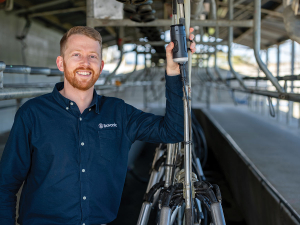Whether fruit or vegetables, there is growth in both domestic and export sales.
Today horticulture is New Zealand's fourth-largest export earner. If we reach our industry target of $10 billion by 2020, for domestic and export sales, we may rise to being third-largest. Today we have achieved about $5b – half way to our industry target.
The bacteria disease Psa slowed our growth by destroying gold kiwifruit vines. But kiwifruit is recovering, and given the growth in NZ's other fruit and vegetable exports, I believe that in the next four years we can reach our target.
Potato growers plan to double fresh and processed exports by 2025 to $200m, capsicums reached $25m in export earnings last year and cherries have just had the biggest export season ever and plan to increase earnings by 30% in the next five years to at least $80m.
The Ministry for Primary Industries forecasts growth of 39% for kiwifruit, 27% for apples and 32% for vegetable exports.
To reach our $10b target there are some critical prerequisites. We must maintain our access to quality highly versatile soils. New housing must be built on land not required for growing fruit and vegetables. Country lifestyle blocks must be planned away from our growing operations and large buffer zones must be reserved between lifestylers' homes and growers' land.
We need access to water, and that access -- depending on the crop -- must be available for frost fighting and watering plants in high summer.
In the Pukekohe region, where many of the country's vegetables are grown, 'urban creep' is putting at risk our ability to grow food needed to feed NZ. I'm not being overly dramatic. If we lose access to the high quality soils around Pukekohe, NZ may need to import vegetables, becoming dependent on other countries. The soils around Pukekohe, not found elsewhere in NZ, are particularly good for growing vegetables, especially in winter.
We have made the following three minute videos about the challenges facing Pukekohe:
The importance of Pukekohe/ Pukekawa https://www.youtube.com/watch?v=QsFUtMsayeI
Pressures on Pukekohe https://www.youtube.com/watch?v=6wvjK8fmkco
Water pressure on Pukekohe https://youtu.be/He-pGH7Bxuc
There are other critical factors for successful growing; one is biosecurity. The invasion of Psa came close to destroying the gold kiwifruit industry, but Psa is only one of many pests and diseases affecting horticulture. Equally crippling are invasive pests like the tomato potato psyllid, the great white butterfly, velvetleaf, citrus white fly and the red-vented bulbul.
In common with other pests and diseases they have come into NZ through our borders and are then almost impossible to eradicate. Control takes time and money, reduces our productivity and may hamper our exports.
Our industry works with the Ministry of Primary Industries through joint agreements to strengthen our protection pre-border and at the border and to plan effective responses when a pest or disease gets in. Good progress is being made now that we are in partnership with Government.
No matter how good a biosecurity system is, travellers to and from overseas and the volume of trade through our seaports puts our industries constantly at risk.
This is the first article in a regular monthly series that will explain the key issues and the facts about horticulture in NZ.
• The views expressed in this article are those of the author.











